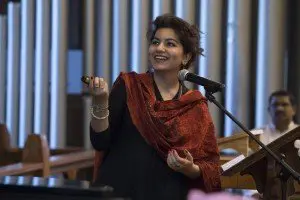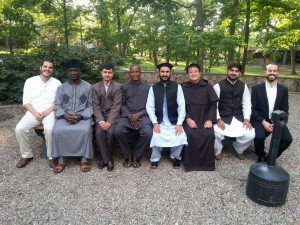







Drew Institute on Religion and Conflict Transformation, 2018
2018 Drew Institute Resources for Participants.
Drew Institute Schedule
Drew University Campus Map
Drew Institute Faculty, 2018.
Jared Maples
Jared Maples first joined the New Jersey Office of Homeland Security as Director of the Division of Administration in January 2016. His responsibilities entail information technology and security, human resources, facilities management, and financial activities, which included oversight of New Jersey’s federal homeland security grants. Maples is an experienced executive and intelligence officer; he served for over ten years in many leadership positions at the Central Intelligence Agency and U.S. Department of Defense. With a career focused on both security operations and strategic management, he continues to serve as a member of the Board of Trustees for the federal Government Employee Voluntary Investment Fund. Maples earned his MBA from Georgetown University, and his bachelor’s degree from Villanova University. He has an associate’s degree from Valley Forge Military College.
Melanie Robbins
Melanie Robbins is the Senior Associate Regional Director for the Anti-Defamation League New York Office (ADL). She is responsible for ADL New York’s communal engagement and coalition building predicated on shared values and aimed at addressing common challenges facing communities, especially groups targeted by hate, prejudice and injustice. Her work includes: building interfaith & intergroup partnerships, working with Law Enforcement partners and engaging diverse communities in ADL programming, coalition advocacy efforts and more.
Prior to joining ADL, Robbins lived in Tel Aviv, where she was the Director of Development and International Relations for the Israeli peace movement- Peace Now. Previously she served as the Resource Development Coordinator for a joint Israeli-Palestinian peace education program, Windows: Channels for Communication. Robbins holds an MA in Security and Diplomacy Studies from Tel Aviv University; and a BA in Political Science, Middle East Studies, and Women & Gender Studies from Drew University. In addition to grassroots peacebuilding projects in Israel and the Palestinian territories, Robbins has been involved in development projects in West Africa. She served as a fellow at the Drew University Center on Religion, Culture and Conflict and was the former assistant to renowned Egyptian Democracy Advocate Dr. Saad Eddin Ibrahim. Robbins’s research on the impact of development aid on human rights was published in 2011. Robbins is a mother of two, wife and social justice advocate by nature.
Mohamed Salih Abubakr
Mohamed Salih Abubakr is the Founder and President of the African Middle Eastern Leadership Project, an independent, non-partisan organization based in Washington DC. A human rights activist and peacemaker from Sudan, Abubakr created his first organization at the age of 14 in response to the genocide in Darfur in 2004. Since then, he has founded several humanitarian and human rights organizations in Sudan and has led a variety of international initiatives focused on peace, regional security and intercultural and interfaith dialogue. In particular, he played a pivotal role in the YaLa Young Leaders movement to promote understanding between Israeli and Arab youth and has led several initiatives to engage Jews, Muslims, and members of other faiths across the Middle East and North Africa in dialogue and cooperation. Since his arrival in the United States in March of 2016, Abubakr has shared his story and experiences with audiences at various institutions, including Stanford University, U.C. Berkeley, the Anti-Defamation League, the American Jewish Congress, Diller Teen Fellows, Congregation Beth Jacob, Sixth & I Synagogue, and Hillel chapters on numerous campuses across the country, and many others. In April 2017 he testified on “The Questionable Case for Easing Sudan Sanctions” before the House Committee on Africa, Global Health, Global Human Rights, and International Organizations.
Prof. Chris Taylor
Chris Taylor is a Professor of Islamic Studies at Drew University and former Director of the Drew University Center on Religion, Culture & Conflict (CRCC). Professor Taylor (B.A., Johns Hopkins; M.A. & Ph.D., Princeton University) has served on the Drew faculty since 1991. Previous to his appointment at Drew, Dr. Taylor served for one year as the Acting Executive Director of the Center for Arabic Study Abroad (CASA) at the American University in Cairo (AUC) and as the Dean of Calhoun College and Instructor of Near Eastern Studies at Yale University. Dr. Taylor’s research and scholarship deal with the social history of religion in the medieval Islamic world and the crisis of religious leadership in the contemporary Islamic world. He is the author of In the Vicinity of the Righteous: Ziyara and the Veneration of Muslim Saints in Late Medieval Egypt (Brill, 1999), and a number of articles on aspects of popular piety in Islam. He is currently working on a study about the social construction of moral imagination in the medieval Islamic world. Dr. Taylor has lived and traveled extensively in the Middle East and he has directed fifteen DIS (Drew International Seminars) in Egypt, Israel and Yemen. An avid scuba diver, Dr. Taylor is also a certified scuba instructor and frequently teaches scuba at Drew.
Azhar Hussain
Azhar Hussain is the Founder of the Peace and Education Foundation (PEF), a Pakistan-based non-governmental organization dedicated to promoting peace and tolerance by building civil society capacity and empowering religious actors. PEF workshop alumni have initiated numerous interventions within their communities to halt the spread of extremist narratives, developed various peace- and tolerance-building programs, facilitated educational enhancement initiatives, and established sustained mechanisms to protect embattled minority communities from extremist violence in some of the most vulnerable and conflict-affected areas in Pakistan (USCIRF, 2016). Hussain has also served as Senior Vice President for Preventive Diplomacy at the Washington-based International Center for Religion and Diplomacy, an organization that seeks to build religious considerations with the practice of international politics in support of peacebuilding.
Hussain is the recipient of the 2006 Peacemakers in Action Award by the Tanenbaum Center for Interreligious Understanding in New York. He holds a Master’s in International/Intercultural Management from the School of International Training (SIT) Graduate Institute in Vermont. Mr. Hussain has provided educational and intercultural consulting services for numerous multi-national organizations, and has a well-established history of successful training and development initiatives throughout the world, including in India, Pakistan, Egypt, Turkey, the United States, and Mexico. He has also organized and delivered presentations at numerous conferences around the world, including at the Council on Foreign Relations, the Conflict Prevention and Resolution Forum at Johns Hopkins University, Georgetown University, and to foreign guests of the U.S. State Department’s International Visitors Leadership Program, as well as chaired the Inter-Cultural Seminar on Peace, Tolerance, and Coexistence for the Committee on Cultural Awareness in New Jersey.
David Thaler
David Thaler has a B.A. Summa Cum Laude, from Tulane University, a master’s degree in Public Policy from Harvard’s Kennedy School of Government, and a J.D. from New York University School of Law. He currently serves as Commissioner of the U.S. Federal Mediation and Conciliation Service and has served for many years in the Service’s International & Dispute Resolution Services Division. Commissioner Thaler has over 15 years of experience conducting labor mediation, advising joint labor-management partnerships and training business and labor leaders on five continents in both conflict management and related areas. Professor Thaler teaches courses in conflict resolution, and mediation, and advanced mediation, and in 2018 received Drew’s Thomas H. Kean Scholar/Mentor of the Year Award.
Daisy Khan
Born in Kashmir, Daisy Khan is Executive Director of the Women’s Islamic Initiative in Spirituality and Equality (WISE), a global program, social network and grassroots social justice movement led by Muslim women. WISE is dedicated to empowering Muslim women to fully participate in their communities and nations, as well as amplifying their collective voices. Khan is also Executive Director of the American Society for Muslim Advancement (ASMA), a New York based non-profit organization dedicated to strengthening an expression of Islam based on cultural and religious harmony. ASMA also works towards building bridges between Muslims and the general public. At ASMA, Daisy Khan has created a number of groundbreaking intra- and inter-faith programs. She continues to mentor American Muslims on the assimilation process, balancing faith and modernity, challenges of living as a minority, and intergenerational relationships. To strengthen the voices of women and youth within the global Muslim community, Khan created a cutting-edge international program : Muslim Leaders of Tomorrow (MLT).
Daisy Khan has appeared on numerous media outlets, such as CNN, Al Jazeera, and BBC World’s Doha Debates and is a weekly contributor to the Washington Post’s “On Faith” blog. She is frequently quoted in print publications, such as Time Magazine, the Chicago Tribune, the New York Times, Saudi Gazette, and the Khaleej Times. Khan also worked for twenty-five years as an interior architect for various Fortune 500 companies. In recognition of this important work, Khan is the recipient of numerous awards, including the Interfaith Center Award for Promoting Peace and Interfaith Understanding, Auburn Seminary’s Lives of Commitment Award, and the Annual Faith Leaders Award. She was also selected by Women’s eNews as one of the 21 Leaders for the 21st Century.
Laura Shaw-Frank
Laura Shaw-Frank is a founding board member of JOFA, the Jewish Orthodox Feminist Alliance, and currently serves on JOFA’s Executive Board. A former commercial litigator with a B.A. from Columbia College and a J.D. from Columbia Law School, Shaw-Frank is a Ph.D. candidate in modern Jewish history at the University of Maryland. She is currently Director of Recruiting, Placement and Alumni Affairs at Yeshivat Maharat. Shaw-Frank is a history teacher and Israel guidance counselor at SAR High School in Riverdale. She currently lives in Riverdale with her husband, Rabbi Aaron Frank, and their four children.
Prof. Kate Ott, Drew University
Dr. Kate Ott is assistant professor of Christian social ethics at the theological school at Drew University and a lecturer at Yale Divinity School. Holding a doctorate from Union Theological Seminary, Ott researches Christian social ethics, moral theology, sexuality and childhood/youth studies. She is co-author of the second edition of A Time to Speak: Faith Communities and Sexuality Education, author of the report on a program she leads, Sex and the Seminary: Preparing Ministers for Sexual Health and Justice, and author of Integrating Two Cultures, a review of Mary J. Henhold’s 2010 publication Catholic and Feminist.
Ott’s faith grounds her in a deep belief for practicing hospitality, sharing responsibility for our neighbor, and loving God’s creation. She believes the moral choices we make affect who we are and show who we want to become. Ott is passionate about the intersections of health, education, and the environment for young people, and tries to never disconnect issues of gender, race, class, and sexuality in her work.
Stuart Dezenhall
Stuart Dezenhall is currently a social media manager at Drew University, as well as a member of the game day staff for the New York Jets. He has a background in communications and worked as a manager for United Entertainment Group where he presented media and radio and television interviews for sporting events, corporate programs, and sponsorship initiatives. He has also worked for Dezenhall Resources as an Independent Contractor where he managed crises and public relations issues for Fortune 100 corporations. Dezenhall graduated Cum Laude with Honors from Bucknell University with a double major in Psychology and History, and a minor in Economics.
Prof. Timothy Carter
Professor Carter is a visiting professor from Villanova University who teaches Political Science and International Relations at Drew University. He was born in Iowa, and received his B.A. in Political Science from Iowa State University and earned a Ph.D. in Political Science (2005) from the University of Rochester. His research focuses on how climate and weather changes impact violence in war, with a focus look at the Taliban in Afghanistan. At Drew, Professor Carter has taught in both the Political Science department and the Environmental Science department. His classes in Political Science focus on international security and foreign policy, and in Environmental Science his lectures analyze the effect of climate change on politics and security. Carter also teaches seminar classes on the social impact of climate change.
Prof. Lisa Jordan
Lisa Jordan is Director of the Spatial Data Center at Drew University, and Assistant Professor of Biology & Environmental Studies and Sustainability (ESS). Her teaching and research interests focus on the use of Geographic Information Systems (GIS) in environmental justice, public health, and population geography. In particular, her current research explores demographic changes in countries experiencing acute food insecurity. She also led the United States Environmental Protection Agency (EPA) – Drew University partnership (2013-2015) which promoted spatial analytical research of the Toxic Release Inventory (TRI). Prof. Jordan currently teaches courses which support the undergraduate Civic Engagement curriculum on the Drew campus.
Drew Institute Alumni News.
Peacebuilding: From Pakistan to Palestine

Tareq Samman and Muhammad Hussain, participants in the 2016 Drew Institute on Religion and Conflict Transformation, discussed innovative practices for building peace and justice for communities in conflict.
Tareq Samman is a Palestinian peace activist from Jerusalem. His currently teaches Arabic and Hebrew at Brandeis University while completing M.A.s in Sustainable International Development and Conflict Resolution and Coexistence in The Heller School For Social Policy & Management, Brandeis.
Muhammad Hussain is a peacebuilding educator, interfaith trainer, Islamic scholar, blogger and human rights activist. He has developed textbooks, teacher guides, training manuals and trained thousands of madrasa teachers and graduates, mosque imams, interfaith leaders and peace-champions across Pakistan about appreciation of diversity, inter-religious tolerance, human rights protection, mutual respects and minority rights.
CRCC Summer Institute-trained Leaders work in Israel to improve Muslim-Jewish High School Student Relationships
A new program that brings Muslim and Jewish students together in peer-to-peer interfaith meetings, reports Gedalia Fensterheim, is “clearly an outcome of your summer institute.” Fensterheim is an alum of Institute 2016.
“Unique Interfaith Program Unites AMIT Students with Arab Peers.” May 3, 2018
“The program aims to find common ground between Judaism and Islam and turn those into a bridge that unites the students.”
“The goal of the program, which aims to steer clear of politics and focus on religion, religious practice and customs, is to introduce the teenagers to diverse perspectives on faith, thereby strengthening their religious identity. It also aims to foster a sense of mutual responsibility among the students toward Israeli society.”
“Attending the conference at Drew gave Fensterheim a new perspective about himself and his faith within a wider religious context, and he wanted to do the same for his AMIT students. He reached out to a friend at the Interfaith Encounter Association in Israel to help match the school with a similar one in the Israeli Arab community.”
Read more at amitchildren.org
Drew Institute Alumnus promoted to Senior Special Assistant
Samuel Aruwan, spokesperson for Malam Nasir El-Rufai, the Governor of Kaduna State and 2016 Drew Institute alumnus, was promoted in May 2017 to the position of Senior Special Assistant.
“Aruwan is a hardworking and disciplined journalist with supportive networks across Kaduna state and Northern Nigeria,” reported the Nigerian independent news organization Today.ng. Aruwan attended the African Investigative Journalism at the School of Journalism, Wits University, South Africa, “which focused on promoting peace via journalism.”
Prior to attending Drew’s Summer Institute, Aruwan received training in journalism in 2014 at London’s Tony Blair Institute for Global Change.
Read more about Aruwan in Today.ng.
Drew Institute 2013 Alumni reconnect in Jerusalem
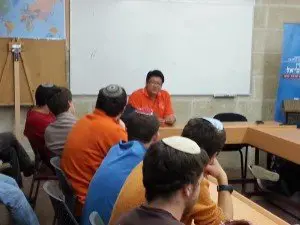 Father Hariawan Adji O. Carm. recently visited with other alumni of the Drew Institute on Religion and Conflict Transformation in the West Bank and Jerusalem. “Harry,” a Catholic Priest and lecturer on the Faculty of Humanities at Airlangga State University in Surabaya, spoke at a Yeshiva in the Etzion Block, where he was hosted by Institute alumnus Rabbi Sarel Rosenblatt. According to Rabbi Rosenblatt, Harry gave a fascinating lecture to about fifty of his Yeshiva students, for whom, “it most probably was a once in a life time opportunity to be able to meet an Indonesian Monk-Priest.”
Father Hariawan Adji O. Carm. recently visited with other alumni of the Drew Institute on Religion and Conflict Transformation in the West Bank and Jerusalem. “Harry,” a Catholic Priest and lecturer on the Faculty of Humanities at Airlangga State University in Surabaya, spoke at a Yeshiva in the Etzion Block, where he was hosted by Institute alumnus Rabbi Sarel Rosenblatt. According to Rabbi Rosenblatt, Harry gave a fascinating lecture to about fifty of his Yeshiva students, for whom, “it most probably was a once in a life time opportunity to be able to meet an Indonesian Monk-Priest.”
One goal of the Institute is to train a generation of young religious leaders, who in turn will train the next generation, and so forth. This is precisely what is happening right now, as Rabbi Rosenblatt explains, for his young rabbinical students, “it was an essential experience on the way to be peace builders.”
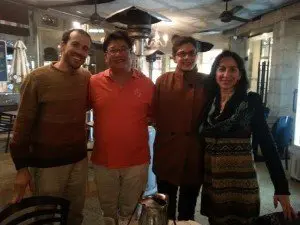 After the program, the rabbi and the priest drove to Jerusalem, where they joined other Institute participants and peace activists Ruth Horenstein and Yael Gidanyan for a walk near the walls of the Old City.
After the program, the rabbi and the priest drove to Jerusalem, where they joined other Institute participants and peace activists Ruth Horenstein and Yael Gidanyan for a walk near the walls of the Old City.
Drew Institute Faculty, 2016.
IMAM MUHAMMAD ASHAFA
Muhammad Ashafa is co-founder of the Interfaith Mediation Centre in Kaduna, Nigeria. Ashafa grew up in a conservative environment, as the eldest son of a Muslim scholar and spiritual leader of the Tijaniyya Sufi order. He followed the family vocation and became an Imam himself, in the context of an Islamist movement in northern Nigeria. This movement reached its peak during the 80’s and 90’s, resulting in increased tensions with the Christian communities. In 1992, violent interreligious conflict broke out in Kaduna State.Muhammad Ashafa went on to become Secretary General of the National Council of Muslim Youth Organizations, an organization promoting debate and confrontation against Christians. During a confrontation between Christians and Muslims in Zongon Kataf, Muhammad Ashafa lost two cousins and his spiritual mentor, while Secretary General of the Kaduna State chapter for the Youth Christian Association of Nigeria (YCAN) Pastor James Wuye lost his right hand. Imam Ashafa recalls a critical turning point, when a mutual friend of the Pastor and Imam said to them: “The two of you can pull this nation together, or you can destroy it. Do something.” Over the next few years, through increasingly frequent meetings and separate religious epiphanies, the two men slowly built mutual respect, and decided to work together to bridge the divide between their communities. In 1995, the two former opponents decided to work together and build bridges between their respective communities through the founding of Interfaith Mediation Centre, a religious grassroots organization that has successfully mediated between Christians and Muslims throughout Nigeria.
RABBI AZRIEL C. FELLNER

Rabbi Azriel Fellner graduated from George Washington University and received graduate degrees in English and American Literature. He was ordained in 1967 at the Jewish Theological Seminary. Rabbi Fellner began his rabbinic career in Alaska as a military chaplain. He was the sole Rabbi for the entire state, and responsible for the spiritual needs of all branches of the military as well as the Jewish civilian population. He was Rabbi of the synagogue in Anchorage and an adjunct professor of English Literature at Alaska Methodist University.
His first civilian pulpit was at the West End Synagogue in Nashville, TN, and he later served as Rabbi at Oceanside Jewish Center on Long Island and Temple Beth Shalom in Livingston, NJ. Rabbi Fellner has also served as Rabbi with Tov Tours and Passover Kosher Travel. In the past twenty years, Rabbi Fellner lectured on homiletics to rabbinical students at the Jewish Theological Seminary. In addition, he was the Social Action Chairman of the Rabbinical Assembly and a contributor to the magazine Conservative Judaism. Rabbi Fellner also studies motion pictures and television, focusing on Jewish images and themes, and has given a series of lectures on film at the Skirball Cultural Center in Los Angeles. He recently lectured at Warner Brothers’ Studios about his unique understanding of the 1927 film release of “The Jazz Singer”.
AZHAR HUSSEIN
As a Pakistani-American and a Muslim, Azhar Hussain has been personally affected by global extremism as well as sectarian violence in Pakistan. Today, he leads a critical effort to equip the next generation with the knowledge and skills necessary for peace and reconciliation. Growing up in Pakistan, Azhar (Azi) witnessed firsthand the influential role of the madrasa education system on Pakistani students and society. Formerly the Vice President for Preventive Diplomacy at the International Center for Religion & Diplomacy (ICRD), Azi worked tirelessly to engage the Pakistani madrasa leaders and help them develop skills to be agents of peacebuilding. On behalf of ICRD, Azi has worked in partnership with local Pakistani religious and civic organizations to design a system of comprehensive training programs for madrasa leaders that equips them with the skills necessary to facilitate these changes.
Through his commitment to the Islamic principles of peace, tolerance, and reconciliation, Azi is laying the groundwork for sectarian harmony within Pakistan and for the reduction of global extremism. After his time with ICRD, Azi became the president of the Peace and Education Foundation (PEF). With PEF, Azi seeks to deepen the work of ICRD to include trainings for madrasa teachers and leaders while building on work with universities to develop certificate programs for madrasa teachers. Azi’s work exhibits a deeply held belief in the power of religion to heal, to motivate and to empower people to bring about powerful social change within their societies and the world at large. What drives his efforts to reform the madrasas is his conviction that religion can be a force for peace and unity rather than division and violence.
DAISY KHAN
Daisy Khan is Executive Director of the Women’s Islamic Initiative in Spirituality and Equality (WISE), a global program, social network and grassroots social justice movement led by Muslim women. WISE is dedicated to empowering Muslim women to fully participate in their communities and nations and amplifying their collective voices. Khan is also Executive Director of the American Society for Muslim Advancement (ASMA), a New York based non-profit organization dedicated to strengthening an expression of Islam based on cultural and religious harmony, as well as building bridges between Muslims and the general public. At ASMA, Daisy Khan has created a number of groundbreaking intra- and inter-faith programs. She continues to mentor American Muslims on assimilation issues, balancing faith and modernity, the challenges of living as a minority, and intergenerational questions. To strengthen the voices of women and youth within the global Muslim community, she created two cutting-edge programs of international scope: Muslim Leaders of Tomorrow (MLT).
Khan has appeared on numerous media outlets, such as CNN, Al Jazeera, and BBC World’s Doha Debates and is a weekly contributor to the Washington Post’s “On Faith” blog and is frequently quoted in print publications, such as Time Magazine, the Chicago Tribune, the New York Times, Saudi Gazette, and the Khaleej Times. Born in Kashmir, she spent twenty-five years as an interior architect for various Fortune 500 companies. In recognition of this important work, Khan is the recipient of numerous awards, including the Interfaith Center’s Award for Promoting Peace and Interfaith Understanding, Auburn Seminary’s Lives of Commitment Award, and the Annual Faith Leaders Award. She was also selected by Women’s eNews as one of the 21 Leaders for the 21st Century.
PROF. KATE OTT
Dr. Kate Ott is a feminist, catholic scholar addressing the formation of moral communities with specializations in sexuality, technology, children/youth, and professional ethics. She is Assistant Professor of Christian Social Ethics at Drew University Theological School and the University Faculty Scholar of Everyday Ethics. She is at work on a new book, Life Enhancing Settings: The Technology and Ethics of Everyday Living. Her other books include: Sex + Faith: Talking with Your Child from Birth to Adolescence and the co-edited volume Faith, Feminism, and Scholarship: The Next Generation. She is a Scholar in Action with the Carter Center’s Mobilizing Faith for Women and Girls program. To find out more about her work visit www.kateott.org.
RABBI SHLOMO RISKIN
Internationally renowned educator, speaker and author Rabbi Dr. Shlomo Riskin attained rabbinical ordination at Yeshiva University from his mentor, Rabbi Joseph B. Soloveitchik, and his Ph.D. from New York University. His outstanding contributions to Israel and to world Jewry over the course of his career have made him one of the leading voices of today’s Modern Orthodox world. Rabbi Riskin founded and serves as Chancellor of Ohr Torah Stone, a network of educational institutions based upon the synthesis of Torah values with contemporary living and tikkun olam. In 1983, Rabbi Riskin left a thriving career as spiritual leader of Manhattan’s Lincoln Square Synagogue to make aliya and become the founding chief rabbi of Efrat, Israel, where he lives today with his wife, children and grandchildren. He is a veteran contributor to The Jerusalem Post and author of multiple books. He belongs to the Modern Orthodox stream of Judaism and is active in interfaith work, founding the Center for Jewish-Christian Understanding and Cooperation.
DIRECTOR CHRIS RODRIGUEZ, PHD.
Chris Rodriguez leads New Jersey’s Office of Homeland Security and Preparedness. Prior to his appointment, in July 2014, Director Rodriguez served for more than a decade in the U.S. intelligence community, where he monitored terrorist groups in the Middle East and South Asia, closely collaborating with partners at the federal, state and local levels to identify and counter persistent threats to the United States and its allies. In 2011–12, he served as a policy adviser on Governor Christie’s staff. Director Rodriguez has been recognized with several awards from the Director of National Intelligence. He served in Iraq in 2006–07 and has traveled to over two dozen countries. Since taking over OHSP as Director, Rodriguez has grown the membership and scope of the agency’s Interfaith Advisory Council. Director Rodriguez holds a bachelor’s degree from Williams College and a master’s degree and PhD from the University of Notre Dame.
LAURA SHAW-FRANK
Laura Shaw-Frank is a founding board member of JOFA, the Jewish Orthodox Feminist Alliance, and currently serves on JOFA’s Executive Board. Shaw-Frank is a PhD candidate in modern Jewish history at the University of Maryland and is currently Director of Recruiting, Placement and Alumnae Affairs at Yeshivat Maharat. She is also a history teacher and Israel guidance counselor at SAR High School in Riverdale. Prior to becoming a history educator, Laura was a commercial litigator. Laura has a B.A. from Columbia University and a J.D. from Columbia Law School. She lives in Riverdale with her husband, Rabbi Aaron Frank, and their four children.
DAVID THALER
David Thaler has a Master’s in Public Policy from Harvard’s Kennedy School of Government, a J.D. from New York University, and a B.A. Summa Cum Laude from Tulane. He currently serves as a Commissioner of the U.S. Federal Mediation and Conciliation Service and served for many years in the Service’s International & Dispute Resolution Services Division. Commissioner Thaler has over 15 years of experience performing labor mediation, advising joint labor-management partnerships and in training business and labor leaders on five continents in both conflict management and related skills. Professor Thaler teaches courses in practicum of conflict resolution and mediation and advanced mediation.
PASTOR JAMES WUYE
James Wuye, Assemblies of God Pastor, is co-founder/director with Imam Muhammad Ashafa of the Interfaith Mediation Center of the Muslim-Christian Dialogue in the Kaduna State, Northern Nigeria. During the 1980s and 1990s, James Wuye got involved in Christian activism, and for eight years he served as Secretary General of the Kaduna State chapter for the Youth Christian Association of Nigeria (YCAN), an organization representing all Christian groups in the country. During a confrontation between Christians and Muslims in Zongon Kataf, James Wuye lost his right arm. Continued fighting and resentment would be the easy choice, but James Wuye was convinced otherwise. He, along with Imam Muhammad Ashafa, decided to build bridges between the Christian and Muslim communities.
With this aim in view, the pastor and imam launched the Interfaith Mediation Center of the Muslim-Christian Dialogue, an organization with over 10,000 members providing interfaith training to young people in schools and universities, to women, religious leaders, and politicians. The center has thus contributed to defusing tensions in the 2002 and 2004 clashes in Kaduna and Yelwa. Pastor James Wuye and Imam Muhammad Ashafa have received the Breme Peace Award in 2005, the Prize for Conflict Prevention awarded by the Fondation Chirac in 2009 and the Deutsche Afrika-Preis awarded by the German Africa Foundation in 2013.
EHSAN ZAFFAR
Ehsan Zaffar currently serves as an advisor on civil rights and civil liberties issues at the Department of Homeland Security in Washington D.C., where he teach courses on civil rights, privacy and national security. He is a panel member and mediator at the Agency for Dispute Resolution where he mediates intra and inter-community disputes. Zaffar works to help build strong and resilient communities. Prior to government service he worked with communities in post-conflict and post-disaster environments both domestically as well as internationally. He also helped to found a small, self-sustaining mobile legal clinic in Los Angeles to deliver legal care and assistance to remote, at-risk or economically depressed communities.
Public Forum: Drew Institute on Religion and Conflict Transformation, 2016.
 JULY 26, 2016 6:30 P.M.
JULY 26, 2016 6:30 P.M.
CRAIG CHAPEL, SEMINARY HALL
DREW UNIVERSITY
The Drew Institute on Religion and Conflict Transformation ran from July 9-28, 2016. Throughout their stay at Drew, Jewish, Christian and Muslim leaders from around the world convened to draw plans for interfaith work back in their home regions. On July 26, Institute participants, including Egyptians, Indonesians, Israelis, Nigerians, Pakistanis, and Palestinians, presented on their work at the Institute.
DREW INSTITUTE ON RELIGION AND CONFLICT TRANSFORMATION
Drew Institute Faculty, 2013
BISHOP MOUNEER ANIS
 Mouneer Hanna Anis is currently the Bishop of the Episcopal / Anglican Diocese of Egypt with North Africa and the Horn of Africa, as well as the President Bishop of Episcopal / Anglican Province of Jerusalem and the Middle East. Mouneer Anis received his Bachelors of Medicine and Surgery at Cairo University, Egypt in 1974.
Mouneer Hanna Anis is currently the Bishop of the Episcopal / Anglican Diocese of Egypt with North Africa and the Horn of Africa, as well as the President Bishop of Episcopal / Anglican Province of Jerusalem and the Middle East. Mouneer Anis received his Bachelors of Medicine and Surgery at Cairo University, Egypt in 1974.
After receiving a diploma in Tropical Medicine and Hygiene in London, England, Dr. Mouneer received a Certificate in Hospital Management and Administrations from the School of Public Health at the University of California. In 1999, Dr. Mouneer was ordained a priest and served at All Saints Cathedral, Cairo. Later, he became the Administrator of the Diocese of Egypt and later was elected by the Diocesan Synod to be the third Egyptian Bishop of the Diocese of Egypt with North Africa and the Horn of Africa. He then did practical and theological training at Moore Theological College in Sydney, Australia, the Diocese of Canterbury in Kent, England as well as Nashotah House in Wisconsin before his consecration. In 2000, Rev. Dr. Mouneer Anis was consecrated the Bishop of the Diocese of Egypt with North Africa and the Horn of Africa. In 2007, Bishop Mouneer was elected as the President Bishop of Jerusalem and the Middle East.
RABBI MICHAEL MELCHIOR
 Rabbi Michael Melchior is the Chief Rabbi of Norway, and a major figure in the global Jewish community. Rabbi Melchior was born in Denmark in 1954, and underwent his ordination as a rabbi at Yeshivat HaKotel in Jerusalem in 1980, and quickly was honored as the Chief Rabbi of Norway. Rabbi Melchior immigrated to Israel in 1986, and quickly became a prominent member of the political community. A member of Meimad (a left-wing Zionist political party), Melchior served as an assistant to the Israeli Minister without Portfolio, Yehuda Amital, in the mid-1990s.
Rabbi Michael Melchior is the Chief Rabbi of Norway, and a major figure in the global Jewish community. Rabbi Melchior was born in Denmark in 1954, and underwent his ordination as a rabbi at Yeshivat HaKotel in Jerusalem in 1980, and quickly was honored as the Chief Rabbi of Norway. Rabbi Melchior immigrated to Israel in 1986, and quickly became a prominent member of the political community. A member of Meimad (a left-wing Zionist political party), Melchior served as an assistant to the Israeli Minister without Portfolio, Yehuda Amital, in the mid-1990s.
Running for Knesset under the One Israel alliance, Melchior was appointed Minister of Social and Diaspora Affairs, which he served as for two years. In 2002, with Palestinian support, Rabbi Melchior spearheaded the Alexandria Process, which began at an interfaith summit in Alexandria, Egypt. With the help of several religious leaders from around the world, Rabbi Melchior explored interfaith cooperation in ending religious conflicts in the region. Since his time in Knesset ended in 2009, Rabbi Melchior has been a steadfast proponent of Arab-Israeli peace. Rabbi Melchior staunchly believes that peace in the Middle East is possible, and is in fact desired from all sides. Rabbi Melchior has received several prizes over the years, including The Norwegian Award for Tolerance and Bridge Building in the Noble Institute, The Church of England’s Coventry International Prize for Peace and Reconciliation, and the Liebhaber Prize for the Promotion of Religious Tolerance and Cultural Pluralism. Rabbi Melchior lives in Jerusalem with his wife Hanna, with whom he has five children.
MARC GOPIN
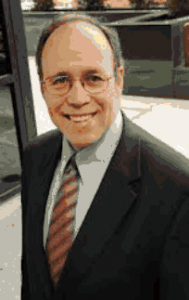 Rabbi Dr. Marc Gopin is the Director of the Center for World Religions, Diplomacy and Conflict Resolution (CRDC), the James H. Laue Professor at the School for Conflict Analysis and Resolution at George Mason University, and co-owner of MEJDI, a peace tourism business that embraces the multiple narratives of indigenous peoples. He has pioneered projects at CRDC in Afghanistan, Iran, Syria, Palestine, and Israel. In 1983, he was ordained as a rabbi at Yeshiva University.
Rabbi Dr. Marc Gopin is the Director of the Center for World Religions, Diplomacy and Conflict Resolution (CRDC), the James H. Laue Professor at the School for Conflict Analysis and Resolution at George Mason University, and co-owner of MEJDI, a peace tourism business that embraces the multiple narratives of indigenous peoples. He has pioneered projects at CRDC in Afghanistan, Iran, Syria, Palestine, and Israel. In 1983, he was ordained as a rabbi at Yeshiva University.
He then received a Ph.D. in religious ethics from Brandeis University in 1993. As an author, professor, researcher, and consultant, he brings an expert eye to issues of peace and global conflict. His emphasis is on the role of religion and culture in not only initiating conflict, but as critical to reaching last resolution between peoples and nations. Rabbi Dr. Gopin is the author of five books. Bridges Across an Impossible Divide: The Inner Lives of Arab and Jewish Peacemakers explores the role of self-examination in the resolution of human conflict as portrayed in the lives and testimonies of indigenous peacemakers. To Make the Earth Whole: The Art of Citizen Diplomacy in an Age of Religious Militancy studies the art of a citizen diplomacy- a process that can address clashes of religion and culture across regional lines even when traditional negotiations between governments can fail. Healing the Heart of Conflict presents an 8-step process based on great religious traditions, philosophy, and psychology for healing even the most destructive, and seemingly intractable, conflicts. Holy War, Holy Peace: How Religion Can Bring Peace to the Middle East asserts that the failure of peace process stems in large part from its complete neglect of cultural and religious factors, discusses the missing factors from the Oslo Process, and declares what will be culturally obligatory for a victorious Arab/ Israeli peace process. Between Eden and Armageddon: The Future of World Religions, Violence and Peacemaking innovates the theoretical and feasible infrastructure for capturing religion in the condition of conflict prevention, governance and resolution, and includes countless chapters in the principal edited volumes of the field of conflict resolution. Rabbi Dr. Gopin has engaged in back channel diplomacy with religious, political and military figures on both sides of conflicts. Furthermore, he has appeared on numerous media outlets, including CNN, CNN International, Al Jazeera English, Al Jazeera Arabic, Al Arabiyah, The Jim Lehrer News Hour, National Public Radio, Voice of America, and radio channels in Sweden and Northern Ireland. He has been published in numerous publications, including the International Herald Tribune, the Boston Globe, the Christian Science Monitor, and his work has been featured in news stories of the Times of London, the Times of India, Associated Press, and Newhouse News Service.
IMAM MUHAMMAD ASHAFA AND PASTOR JAMES WUYE
 Imam Muhammad Ashafa and Pastor James Wuye are the co-directors of the Interfaith Meditation Center of the Muslim-Christian Dialogue in Kaduna, Nigeria. Their organization provides interfaith exposure to men and women of both faiths throughout the region. Imam Ashafa comes from a family of imams belonging to the Tijaniyyah order. A member of Islamist organizations in the 1980s and 1990s, Ashafa became Secretary General of the National Council of Muslim Youth Organizations. Due to Muslim-Christian violence, Ashafa lost his spiritual leader and two of his cousins. Through this tragedy, he met Pastor Wuye, the leader of the local chapter of the Youth Christian Association of Nigeria.
Imam Muhammad Ashafa and Pastor James Wuye are the co-directors of the Interfaith Meditation Center of the Muslim-Christian Dialogue in Kaduna, Nigeria. Their organization provides interfaith exposure to men and women of both faiths throughout the region. Imam Ashafa comes from a family of imams belonging to the Tijaniyyah order. A member of Islamist organizations in the 1980s and 1990s, Ashafa became Secretary General of the National Council of Muslim Youth Organizations. Due to Muslim-Christian violence, Ashafa lost his spiritual leader and two of his cousins. Through this tragedy, he met Pastor Wuye, the leader of the local chapter of the Youth Christian Association of Nigeria.
Wuye, a Christian activist and soldier’s son, lost an arm in the same confrontation that cost the lives of those dear to Ashafa. The two former enemies decided to work together and form the aforementioned organization, in order to build understanding between their two communities so that tragedies such as these will become less common. Since launching the Center in 1995, Imam Ashafa and Pastor Wuye have received the Breme Peace Award and the Fondation Chirac Prize for Conflict Prevention. In 2002 and 2004, similar confrontations began to occur again, and the Center helped to diffuse tension between the two religious groups. Both the Imam and the Pastor paid a heavy price in the conflicts of the past, and are certainly determined to make sure in this case, history does not repeat itself.
DR. JOSEPH G. BOCK
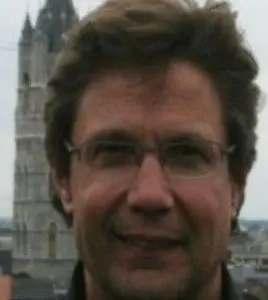 Dr. Joseph G. Bock is the Director of Graduate Studies at the Eck Institute for Global Health at the University of Notre Dame. An international humanitarian, Dr. Bock’s primary focus is violence prevention in troubled regions throughout the world. Dr. Bock received his Ph.D. in International Relations from the School of International Service at American University.
Dr. Joseph G. Bock is the Director of Graduate Studies at the Eck Institute for Global Health at the University of Notre Dame. An international humanitarian, Dr. Bock’s primary focus is violence prevention in troubled regions throughout the world. Dr. Bock received his Ph.D. in International Relations from the School of International Service at American University.
Bock has served with Catholic Relief Services in Pakistan and the West Bank/Gaza Strip, as well as serving with the American Refugee Committee in various locales around the world. A consultant to the World Bank, Bock has previously served the same function with The Asia Foundation, focusing on Thailand, Nepal and Sri Lanka. Dr. Bock previously served six years in the Missouri House of Representatives, acting as chair of the Energy and Environment Committee and Co-Chair of the Commerce Committee. Dr. Bock is a prolific speaker, having spoken at the World Bank, Woodrow Wilson Center, United Nations Assembly in Cairo, Oxford University, University of Karachi and Macalester College on a variety of topics including the Israeli-Palestinian conflict, violence prevention, scenario analysis, ethnic violence and religious extremism. An active humanitarian in the Roman Catholic community, Dr. Bock has also served as a member of the Catholic humanitarian aid organization Caritas Internationalis based out of Vatican City. Dr. Bock is the author of three books, the latest of which is “The Technology of Non-Violence: Social Media and Violence Prevention”. A true man of the world, Dr. Bock’s presence has been felt across the globe through his humanitarian efforts and extensive work in violence prevention.
SHEIK ALI GOMAA
 Dr. Ali Gomaa was born in Beni Suef, Egypt and is the recently retired Grand Mufti of Egypt. After graduating from Ain Shams University in Cairo with a degree in Commerce, he enrolled in al-Azhar University, where he graduated with a Ph.D in Juristic Methodology. From the time he received his M.A. until he was appointed Grand Mufti, he was Professor of Juristic Methodologies at al-Azhar University.
Dr. Ali Gomaa was born in Beni Suef, Egypt and is the recently retired Grand Mufti of Egypt. After graduating from Ain Shams University in Cairo with a degree in Commerce, he enrolled in al-Azhar University, where he graduated with a Ph.D in Juristic Methodology. From the time he received his M.A. until he was appointed Grand Mufti, he was Professor of Juristic Methodologies at al-Azhar University.
In addition to teaching classes on the university campus, he re-established the tradition of giving public lessons in the al-Azhar mosque. He noticed a number of students who had adopted an extremist approach to religion, and engaged the students challenging their understanding of Islam. He also offered them an alternative interpretation of their extremist views. As a result, many of these students renounced extremism and embraced the more moderate vision of Islam that he taught. To this day, this group of scholars continues the tradition of giving informal lessons in the al-Azhar mosque. In 2003, Dr. Ali Gomaa was appointed Grand Mufti of Egypt. Since taking on the position, he has revolutionized the process of issuing fatwas in Egypt, transforming Dar al-Ifta from an institution that was the annex of one individual (the Grand Mufti) to a modern institution with a fatwa council and a system of checks and balances. Furthermore, he has added a technological aspect to the institution by developing an advanced website and call center through which people can request fatwas even if they are unable to come to the institution personally. To this day, he is a prolific author and writer on Islamic issues. He also writes a weekly column in the Egyptian al-Ahram newspaper, where he discusses matters of current interest and religion.
DR. PETER COLEMAN
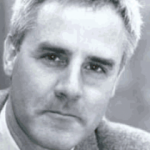 Dr. Peter Coleman is the Associate Professor of Psychology and Education at Columbia University, where he teaches courses in conflict resolution, social psychology and social science research. Dr. Coleman earned his PhD in Social/Organizational Psychology from Teachers College at Columbia University.
Dr. Peter Coleman is the Associate Professor of Psychology and Education at Columbia University, where he teaches courses in conflict resolution, social psychology and social science research. Dr. Coleman earned his PhD in Social/Organizational Psychology from Teachers College at Columbia University.
As well as teaching the aforementioned courses, Coleman serves as the director of Columbia’s International Center for Cooperation and Conflict Resolution at Teachers College, and the chair of the Advanced Consortium on Cooperation, Conflict and Complexity. In addition to these posts at Columbia, Dr. Coleman serves as a research affiliate for the International Center for Complexity and Conflict at the Warsaw School for Social Psychology in Warsaw, Poland. Dr. Coleman has been the recipient of Early Career Award from the American Psychological Association and the CPR Institute for Dispute Resolution 2000 Book Prize for Excellence. Dr. Coleman is a member of Division 48: Society for the Study of Peace, Conflict and Violence. An editor of The Handbook of Conflict Resolution: Theory and Practice, Dr. Coleman has authored over 60 articles in published journals. Dr. Coleman’s particular innovation in this field has been his application of psychology to conflict resolution, as evidenced by his membership in the American Psychological Association, Psychologists for Social Responsibility, Association for Conflict Resolution and International Association of Conflict Management. Dr. Coleman’s official scholarly interests include the constructive use and abuse of social power, motivation dynamics, intractable conflict, social injustice, moral emotions, polarized collective identity formation and sustainable peace. Dr. Coleman’s application of psychological principles to the field of conflict resolution is highly innovative as he explores the motivations behind conflict.
AZHAR HUSSAIN
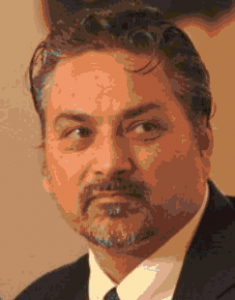 As the Vice President for Preventive Diplomacy at the international center for Religion and Diplomacy and head of the Madras Enhancement program in Pakistan, Azhar Hussain understands the need for conflict resolution and feels as though religion is the main factor to promote resolution. Azhar grew up in Pakistan, where he witnessed firsthand the influential role of the madrasa education system on Pakistani students and society.
As the Vice President for Preventive Diplomacy at the international center for Religion and Diplomacy and head of the Madras Enhancement program in Pakistan, Azhar Hussain understands the need for conflict resolution and feels as though religion is the main factor to promote resolution. Azhar grew up in Pakistan, where he witnessed firsthand the influential role of the madrasa education system on Pakistani students and society.
He uses his skills and knowledge to teach the new generation that peace is obtainable, and he provides them with insights. He has also dedicated his time to providing Madras leaders in Pakistan with the proper knowledge to promote peace and resolution in their perspective communities. Azhar’s work demonstrates that the need for social change should come from efforts made within societies in order the country to become better as a whole. On behalf of ICRD, Azi has worked in partnership with local Pakistani religious and civic organizations to design a system of comprehensive training programs for Madras leaders. Since 2004, Azi has conducted numerous training workshops, bringing together Madras leaders from each of Pakistan’s five Muslim sects. While others use campaigns, and worldwide organizations for peace, what drives Azhar’s efforts to create peace is his belief that religion can be used for peace and unity rather than division and violence.
ARJUNA PARAKRAMA
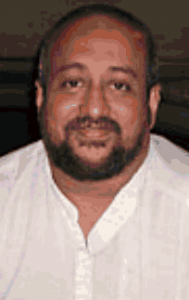 Arjuna Parakrama is the Professor and Chair of the English Department at Peradeniya University in Sri Lanka, which he joined after nearly 20 years at the metropolitan University of Colombo. Dr. Parakrama’s has many research interests, and his current research interests include issues relating to language and equity in higher education, the relationship among marginalization, conflict and human rights, patterns of dominant discourse and subaltern resistance, and collective psychosocial trauma in post conflict societies.
Arjuna Parakrama is the Professor and Chair of the English Department at Peradeniya University in Sri Lanka, which he joined after nearly 20 years at the metropolitan University of Colombo. Dr. Parakrama’s has many research interests, and his current research interests include issues relating to language and equity in higher education, the relationship among marginalization, conflict and human rights, patterns of dominant discourse and subaltern resistance, and collective psychosocial trauma in post conflict societies.
In addition to his academic work, for which he has received a Guggenheim Grant and Senior Fellowships from the US Institute of Peace and the Carnegie Institute for Ethics and International Affairs, Arjuna counts 15 years as a community development practitioner and trainer. He has worked for UNDP as an Advisor on Peace and Development, and is currently a Consultant to the UN Officer of the High Commissioner on Human Rights, studying the relationship between poverty, conflict and human rights. Dr. Parakrama also lead a team of international experts who devised a plan for the tsunami response in four of Asias worst affected countries in 2005.
DR. PETER OCHS
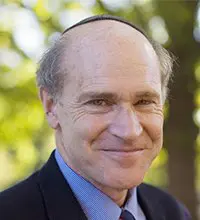 Dr. Peter Ochs is the Edgar Bronfman Professor of Modern Judaic Studies at the University of Virginia, where he also is the director of the Religious Studies Graduate Programs in “Scripture, Interpretation, and Practice” – an interdisciplinary approach to the Abrahamic traditions and more.
Dr. Peter Ochs is the Edgar Bronfman Professor of Modern Judaic Studies at the University of Virginia, where he also is the director of the Religious Studies Graduate Programs in “Scripture, Interpretation, and Practice” – an interdisciplinary approach to the Abrahamic traditions and more.
Additionally, he is a co-founder of the (Abrahamic) Society for Scriptural Reasoning. He is an influential thinker whose interests include Jewish philosophy and theology, modern and postmodern philosophical theology, pragmatism, and semiotics. He earned his B.A. from Yale University, an M.A. from The Jewish Theological Seminary, and a Ph.D. from Yale University. He has authored, co-authored, and co-edited a number of books including Another Reformation: Postliberal Christianity and the Jews; The Jewish-Christian Schism Revisited; Peirce, Pragmatism, and the Logic of Scripture; Reviewing the Covenant: Eugene B. Borowitz and the Postmodern Renewal of Theology; Christianity in Jewish Terms; Reasoning after Revelation: Dialogues in Postmodern Jewish Philosophy; The Return to Scripture in Judaism and Christianity; and Understanding the Rabbinical Mind. With Stanley Hauerwas, he co-edited the book series, Radical Traditions: (Jewish, Christian, and Muslim) Theology in a Post-critical Key. Dr. Ochs also serves on the editorial boards of Modern Theology, Theology Today, The Journal of Scriptural Reasoning, and The Journal of Textual Reasoning, and Crosscurrents.
Drew Institute on Religion and Conflict Resolution: International Partners, 2013.
Drew University’s Center on Religion, Culture & Conflict (CRCC)
A collaborative endeavor, CRCC is working closely with five highly respected and experienced partner organizations from around the world. Learn about our partners in Indonesia, Pakistan, Israel, Egypt, and Nigeria.
EGYPT
Arkan, an interfaith understanding initiative initiated by the Anglican Church of Egypt and North Africa
ISRAEL
Mosaica, The Center for Inter-religious Cooperation in Israel
PAKISTAN
The Peace and Education Foundation (PEF) in Pakistan
INDONESIA
The Indonesian Consortium for Religious Studies (ICRS)
NIGERIA
The Interfaith Mediation Center (IMC) in Kaduna, Nigeria


